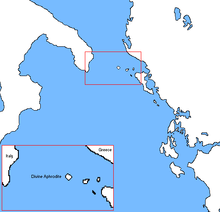Divine Aphrodite (island nation)
| This page is a work in progress by its author(s) and should not be considered final. |
| Theocracy Of Divine Aphrodite Θεία Ἀφροδίτη
|
||||
|---|---|---|---|---|
|
||||
| Motto: A Heart That Loves Is Always Young | ||||
| Anthem: The Herald Of The Goddess | ||||
Divine Aphrodite's location within the Ionian Sea.
|
||||
| Capital | Carthonia | |||
| Official languages | Greek ∙ English | |||
| Demonym | Aphrodites | |||
| Government | ||||
| - | Queen | Elena Pallas | ||
| Area | ||||
| - | Total | 12 km2 5 sq mi |
||
| Population | ||||
| - | census | 2,880 | ||
| Currency | Euro (EUR) |
|||
| Time zone | EET (UTC+2) | |||
| - | Summer (DST) | EEST (UTC+3) | ||
| Calling code | +301 | |||
| Internet TLD | .da | |||
Divine Aphrodite (Greek: Θεία Ἀφροδίτη), known simply as Aphrodite by it's residents, is a small island in the Ionian Sea, westwards from the islands of Corfu and Othonoi, as well as Greece itself.
Etymology
The name originates from their worshipped goddess, Aphrodite. Prior to 1571, it was simply named Aphrodite, and again prior to that, Aphrodite Pandemos, or Common Aphrodite, for the idea that she holds relation to the citizens. It is believed this is the origin of Plato's distinction of two Aphrodites (Ourania and Pandemos).
History
Earliest Settlements - 3rd Century BC
Main Article: Ancient Divine Aphrodite
The earliest occurrence of human presence is in a cavern found near the capital city of Carthonia, dated back to some time around 275,000 BC. It contained flint spearheads and cave paintings resembling a crude map of the area.
Divine Aphrodite's ancient form joins the Minoan Civilization in being one of the earliest developed civilizations, being found to have traded with the Minoans on at least one occasion. There is also evidence of having influenced Mycenaean culture - sharing the Linear B script with them. At this point in time, their religion seems to have first occurred, palaces and temples dedicated to Aphrodite beginning to appear. It appears that soon after this, they shared their goddess with the Phoenicians.
As the Mycenaeans found the civilization to be too minute to bother with, they survived the Dark Ages, though they followed through with the switchover from Linear B to Ancient Greek script, as did the rest of Ancient Greek culture.
Around this time, they began to build a positive relationship with Greece. An inscription on a statue in Lefkada labels Aphrodite as "The goddess shared by Hellas and Aphrodite Pandemos." Mythological tales were shared between the two, creating a shared religion that Aphrodite-Grecian follows after this point in time. They also sent two runners to partake in the first Olympic Games, and all following games, becoming a victor in at least one.


